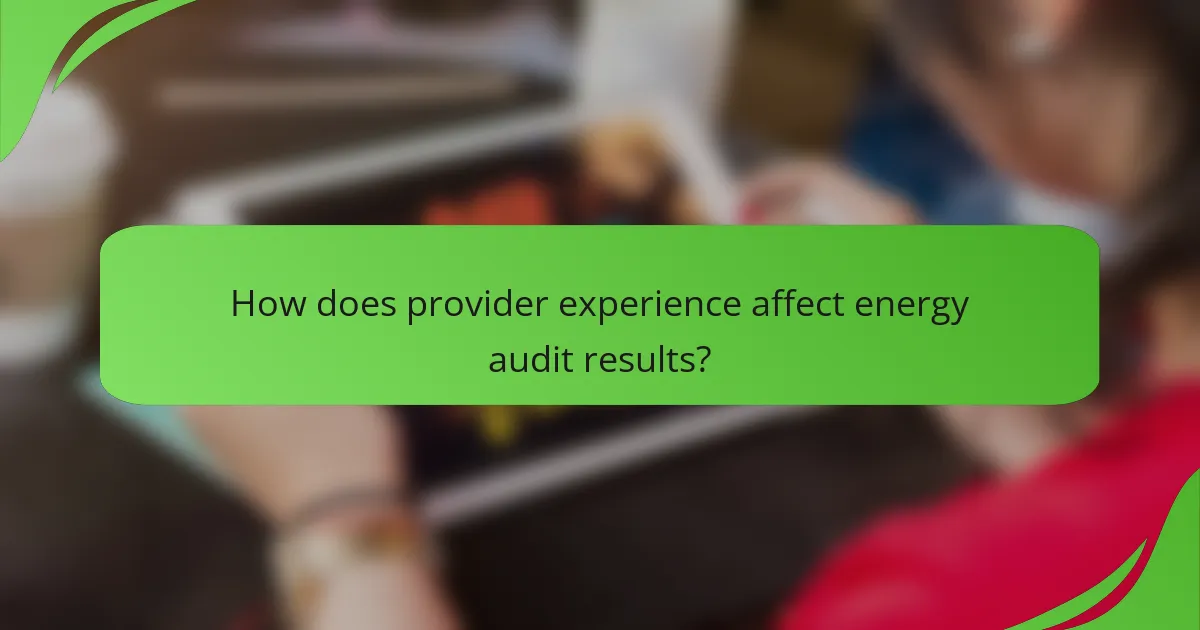The experience of energy audit providers plays a crucial role in determining the effectiveness and accuracy of audit results. Skilled auditors are better equipped to identify inefficiencies and propose actionable solutions, ultimately leading to greater energy savings and enhanced client satisfaction. By prioritizing training, technology, and effective communication, providers can significantly improve their audit outcomes and client relationships.

How does provider experience affect energy audit results?
Provider experience significantly impacts the outcomes of energy audits by influencing the accuracy of findings, client satisfaction, and potential energy savings. Experienced auditors are more adept at identifying inefficiencies and recommending effective solutions, leading to better overall results.
Influence on accuracy of findings
The accuracy of energy audit findings is closely tied to the provider’s experience. Seasoned auditors possess a deep understanding of building systems and energy consumption patterns, enabling them to detect issues that less experienced auditors might overlook. This expertise often results in more precise assessments and tailored recommendations.
For example, an experienced auditor may recognize subtle signs of energy loss, such as inadequate insulation or inefficient HVAC systems, which can significantly affect energy performance. In contrast, a novice may miss these critical details, leading to less effective solutions.
Impact on client satisfaction
Client satisfaction is often higher when audits are conducted by experienced providers. Clients appreciate thorough assessments and clear communication, which seasoned auditors typically deliver. This rapport fosters trust and encourages clients to implement recommended changes.
Moreover, satisfied clients are more likely to refer services to others, which can enhance the provider’s reputation and lead to more business opportunities. Ensuring that clients feel informed and valued throughout the audit process is essential for maintaining high satisfaction levels.
Correlation with energy savings
There is a strong correlation between the experience of the provider and the potential for energy savings. Experienced auditors are more likely to recommend effective measures that lead to significant reductions in energy consumption. Their familiarity with various technologies and practices allows them to suggest solutions that are both practical and impactful.
For instance, an experienced auditor might recommend specific upgrades, such as energy-efficient lighting or advanced thermostats, which can lead to savings of 20-30% on energy bills. In contrast, less experienced auditors may suggest generic solutions that do not address the unique needs of the client’s situation.

What are the best practices for energy audit providers?
Energy audit providers can enhance their effectiveness and results by following best practices that focus on training, technology, and communication. Implementing these strategies leads to more accurate assessments and improved client satisfaction.
Training and certification programs
Energy audit providers should prioritize training and certification to ensure their auditors are knowledgeable about current standards and practices. Programs accredited by recognized organizations, such as the Building Performance Institute (BPI) or RESNET, equip auditors with essential skills and knowledge.
Regularly updating training to include the latest technologies and methodologies is crucial. This can involve attending workshops, online courses, or industry conferences to stay informed about advancements in energy efficiency practices.
Use of advanced auditing tools
Utilizing advanced auditing tools significantly improves the accuracy and efficiency of energy audits. Tools such as thermal imaging cameras, blower doors, and energy modeling software allow auditors to identify issues that may not be visible to the naked eye.
Investing in these technologies can lead to more precise energy consumption estimates and recommendations. Providers should consider the cost-benefit ratio of these tools, as they can enhance audit quality and client trust, ultimately leading to better project outcomes.
Client communication strategies
Effective communication with clients is essential for successful energy audits. Providers should clearly explain the audit process, expected outcomes, and potential savings to set realistic expectations. This transparency fosters trust and encourages client engagement.
Regular updates during the audit process can also enhance client satisfaction. Using visual aids, such as graphs or charts, to present findings can help clients understand complex data and make informed decisions about energy efficiency improvements.

How can energy audit providers improve their effectiveness?
Energy audit providers can enhance their effectiveness by adopting structured approaches that focus on feedback, ongoing training, and advanced technology. These strategies help ensure audits are thorough, accurate, and aligned with client needs.
Implementing feedback mechanisms
Feedback mechanisms are essential for energy audit providers to understand their performance and areas for improvement. Regularly collecting feedback from clients can reveal insights into the audit process, helping providers refine their methodologies and enhance customer satisfaction.
Providers should consider using surveys or follow-up interviews after audits to gather this information. Analyzing feedback can lead to actionable changes, such as adjusting communication styles or modifying audit techniques to better meet client expectations.
Continuous professional development
Continuous professional development is crucial for energy audit providers to stay current with industry trends and regulations. Engaging in workshops, certifications, and training programs can equip auditors with the latest knowledge and skills necessary for effective audits.
Providers should allocate time and resources for their teams to participate in relevant training. This not only improves individual competencies but also enhances the overall quality of audits, leading to better energy-saving recommendations for clients.
Leveraging technology for data analysis
Leveraging technology for data analysis allows energy audit providers to process large amounts of information efficiently. Utilizing software tools can help in identifying patterns, calculating energy consumption, and generating detailed reports quickly.
Providers should invest in data analysis tools that align with their specific needs, such as energy modeling software or building management systems. This investment can lead to more accurate assessments and actionable insights, ultimately improving the effectiveness of energy audits.

What metrics should be used to evaluate provider performance?
To effectively evaluate provider performance in energy audits, key metrics include customer satisfaction scores, audit accuracy rates, and energy savings achieved. These metrics provide a comprehensive view of how well a provider meets client expectations and delivers tangible results.
Customer satisfaction scores
Customer satisfaction scores are crucial for assessing how clients perceive the quality of the energy audit service. These scores can be gathered through surveys and feedback forms, typically using a scale from 1 to 10 or a simple yes/no format. High satisfaction scores often correlate with repeat business and referrals.
To improve customer satisfaction, providers should focus on clear communication, timely service delivery, and addressing client concerns promptly. Regular follow-ups after the audit can also enhance the client experience and provide valuable insights for service improvement.
Audit accuracy rates
Audit accuracy rates measure the precision of the energy audit findings compared to actual energy consumption and savings. This metric is essential as it reflects the reliability of the audit results, which can influence client trust and decision-making. Providers should aim for accuracy rates above 90% to ensure credibility.
To maintain high accuracy rates, providers should use standardized methodologies and tools that comply with industry best practices. Regular training for auditors and periodic reviews of audit processes can help minimize errors and enhance overall performance.
Energy savings achieved
Energy savings achieved is a critical metric that quantifies the actual reduction in energy consumption resulting from the audit recommendations. This can be measured in kilowatt-hours (kWh) or monetary savings, depending on the client’s energy costs. Effective audits should aim to deliver savings that are significant enough to justify the investment in the audit itself.
To maximize energy savings, providers should ensure that their recommendations are practical and tailored to the specific needs of the client. Tracking the long-term impact of these recommendations can also provide valuable data for future audits and enhance the provider’s reputation in the market.

What role does local regulation play in energy audits?
Local regulation significantly influences energy audits by establishing the standards and requirements that auditors must follow. These regulations ensure that energy audits are conducted consistently and effectively, ultimately impacting the results and recommendations provided to clients.
Compliance with state energy codes
State energy codes dictate the minimum efficiency standards for buildings, which energy auditors must consider during their assessments. Compliance with these codes ensures that the audit results reflect the legal requirements for energy use and efficiency, helping property owners avoid penalties and improve their energy performance.
For example, in the United States, many states have adopted the International Energy Conservation Code (IECC), which sets specific guidelines for residential and commercial buildings. Auditors must be familiar with these codes to provide accurate evaluations and actionable recommendations.
Influence of local incentives
Local incentives, such as rebates or tax credits for energy-efficient upgrades, can significantly affect the outcomes of energy audits. These incentives encourage property owners to invest in energy-saving measures, which can lead to more favorable audit results and higher overall energy efficiency.
For instance, a municipality may offer a rebate for installing energy-efficient HVAC systems. Auditors can highlight these incentives in their reports, motivating clients to take action and potentially increasing the effectiveness of the audit recommendations.

What emerging trends are shaping energy audit practices?
Emerging trends in energy audit practices are significantly influenced by advancements in technology, regulatory changes, and a growing emphasis on sustainability. These trends are reshaping how audits are conducted, making them more efficient and effective in identifying energy-saving opportunities.
Integration of AI in energy assessments
The integration of artificial intelligence (AI) in energy assessments enhances the accuracy and efficiency of audits. AI algorithms can analyze vast amounts of data quickly, identifying patterns and anomalies that human auditors might overlook.
For example, AI can process historical energy consumption data alongside real-time usage, providing insights into peak demand times and potential savings. This technology can also predict future energy needs based on usage trends, allowing for proactive adjustments.
When implementing AI in energy audits, it’s crucial to ensure data quality and relevance. Auditors should focus on collecting comprehensive data sets and consider the specific context of the facility being assessed to maximize the benefits of AI-driven insights.
